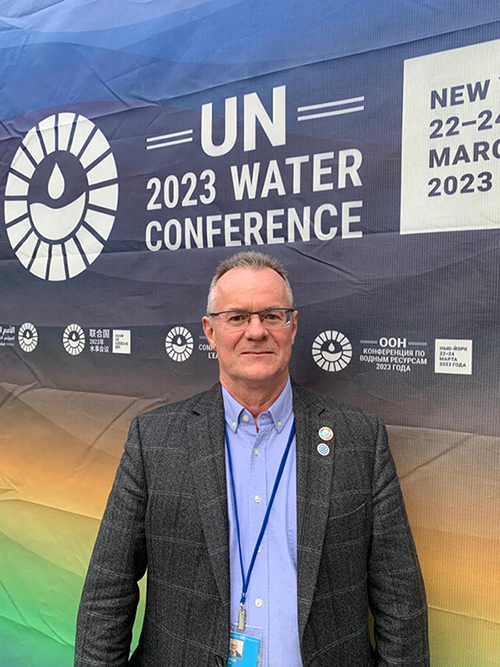Prof Frank Winde, a professor in environmental science at the North-West University (NWU), recently presented a Water Policy Brief at the United Nations (UN) Water Conference that took place at the UN Headquarters in New York.
This was the first global water conference in nearly 50 years and stakeholders across the globe were welcome to attend. Officially known as the 2023 Conference for the Midterm Comprehensive Review of Implementation of the UN Decade for Action on Water and Sanitation (2018-2028), the gathering attracted more than 6 600 delegates from 150 countries.
Prof Winde, who is the chair of the International Geographical Union’s (IGU’s) Commission for Water Sustainability, was approached by the International Science Council (ISC) to draft the brief.
Headquartered in Paris, France, the ISC is the biggest scientific umbrella organisation worldwide and has more than 230 national academies of science as well as international unions of the natural and social sciences as members.
Prof Winde worked on the policy together with a multidisciplinary team of water experts selected by the ISC.
According to Prof Winde, this policy brief is aimed at “engaging policy- and decision-makers and other stakeholders at UN- and member states-level to convert scientific insights into real improvements and support the water-related Sustainable Development Goals (SDGs) and the achievement of the 2030 Agenda”.
In highlighting the need to address the impact associated with significantly expanding mining sectors that secure the mineral resources needed for the global green energy transition, the policy brief speaks directly to a current international research project. The Mine Water Research Group – of which Prof Winde is a member – is currently investigating the impact of mine closure on water resources in the Far West Rand goldfield. They are doing this together with Mintek, Vaal Geography and German partners.
“This perfectly illustrates the principle of thinking globally and acting local. It highlights the importance of science and the value of actionable knowledge in responding to current global water crises as well as contemporary and future challenges,” says Prof Winde.
“The main takeaway is a clear call to action to address the multiple water crises across the world, increasingly affecting billions of people. We as scientists at the ISC stand ready to guide such action with evidence-based advice,” he adds.
He says – given the increasing competition for water and the urgency to meet water goals – there is a need to avoid partial solutions to complex problems.
“Science that is independent, open and transparent has a key role to play to provide a robust basis for collaboration and joint action.”
Prof Wine delivered key messages during an interactive dialogue at the conference. Watch the segment on the UN web TV channel here.

Prof Frank Winde.
